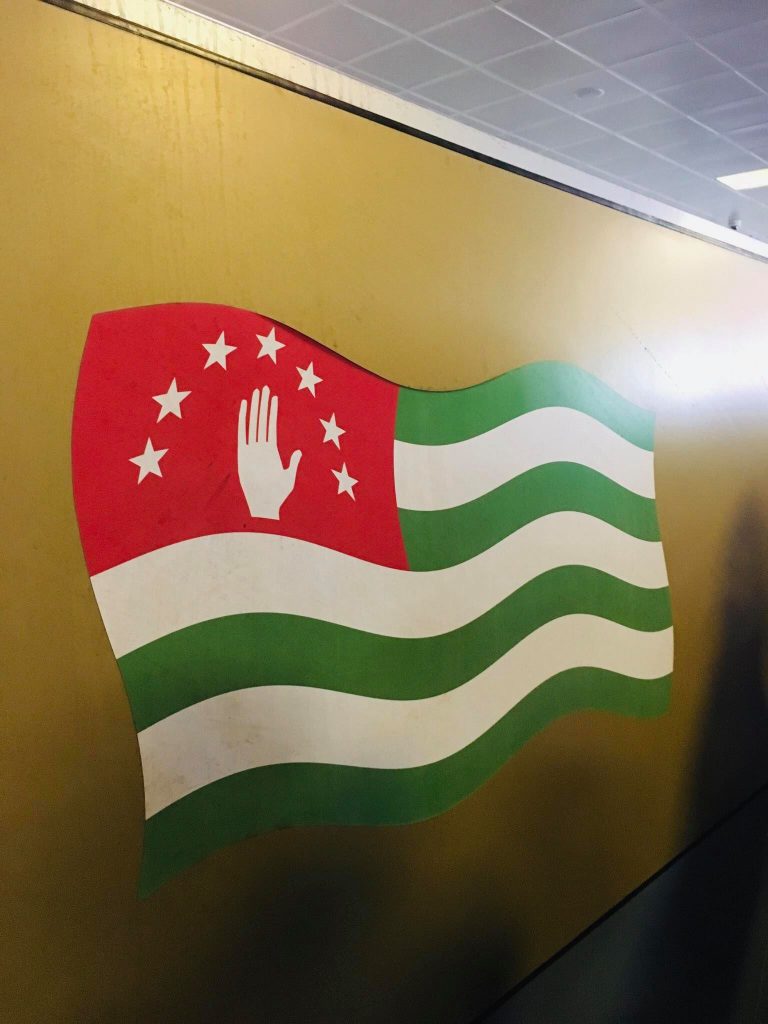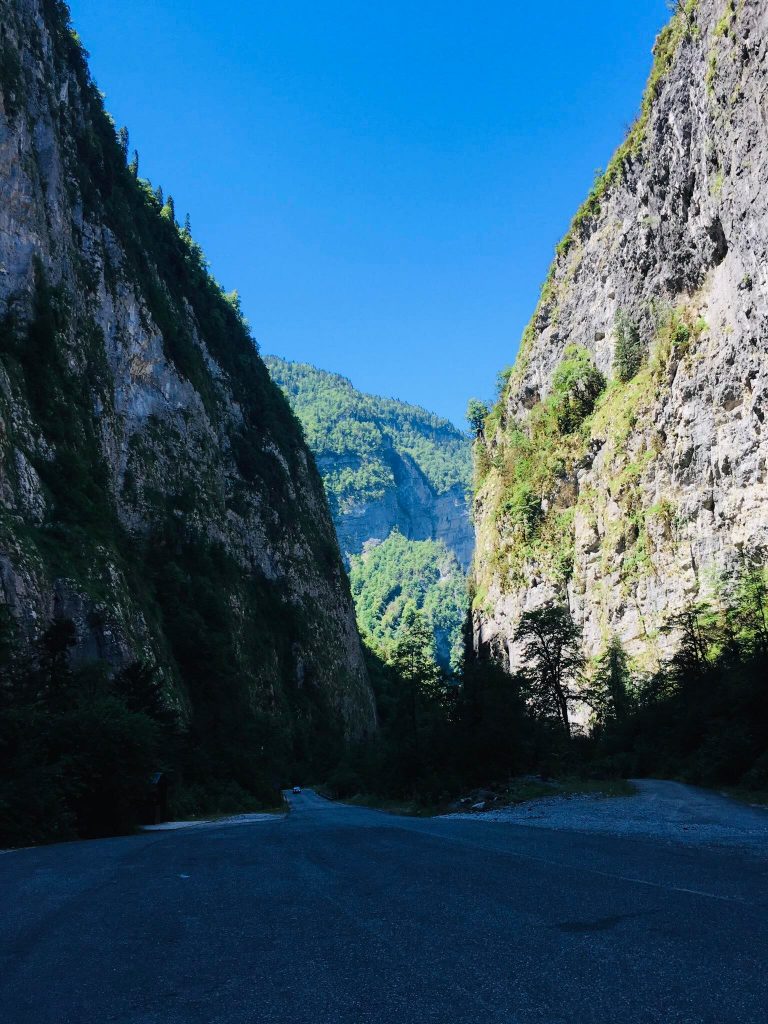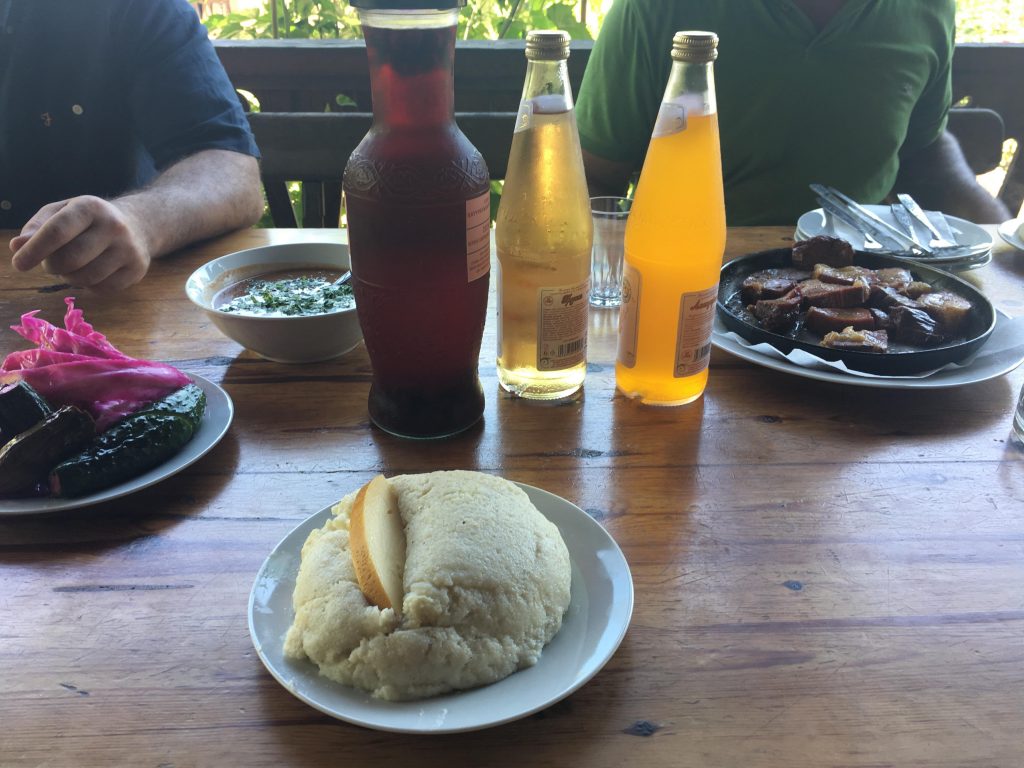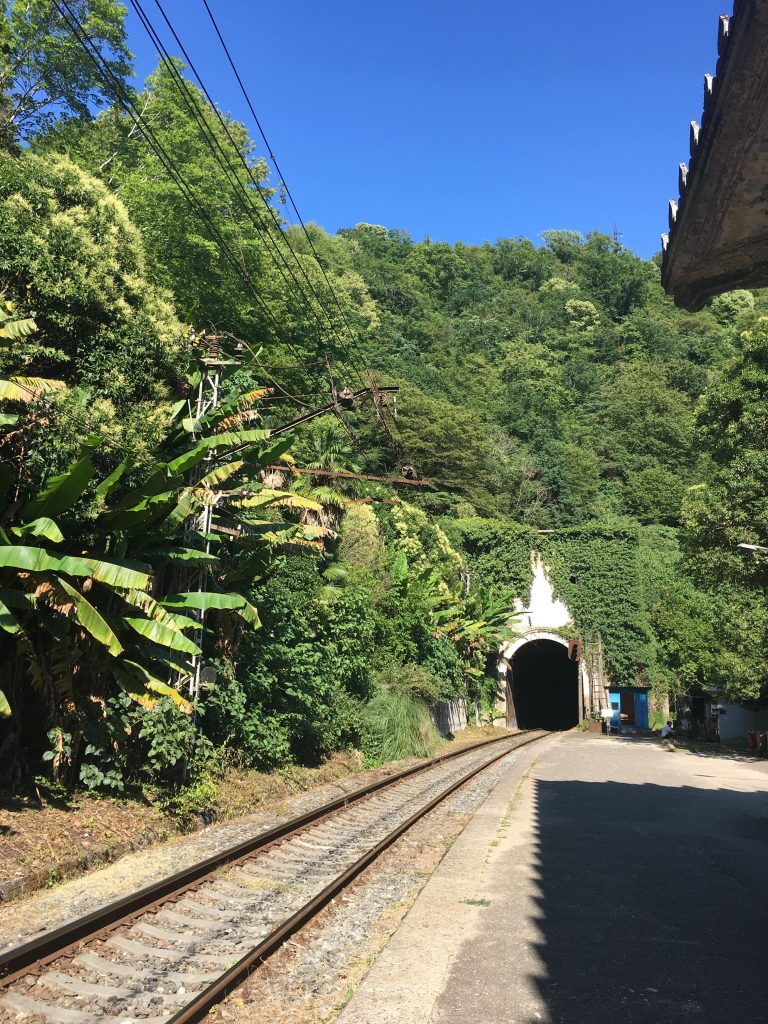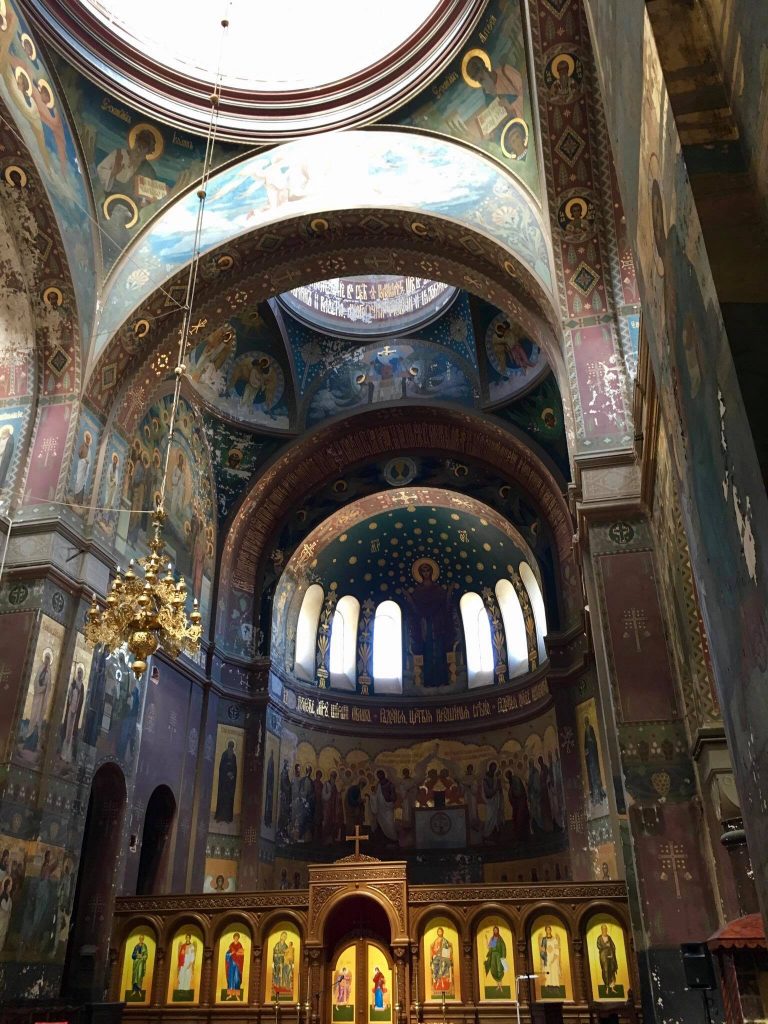‘Good day David! Due to the FIFA World Cup in Russia, the Consular Department of the Ministry of Foreign Affairs, Republic of Abkhazia, informs all foreign citizens visiting the Republic of Abkhazia during the period from June 15, 2018, to August 01, 2018, that it will operate a visa-free regime.’
If ever there was an invitation to visit the breakaway state of Abkhazia this was it. Fresh from watching Harry Kane’s stoppage time winner against Tunisia in the hero-city of Volgograd, and with several free days before England’s next match in Nizhny Novgorod, the chance to visit the place once known as ‘the jewel in the crown of the Soviet Union’ couldn’t be missed. A short overnight train (by Russian standards) brings you to the summer beach resort of Sochi on the edge of the Black Sea, and from there it was a short taxi ride to the barbed wire border.
Once an incorporated part of Soviet Georgia, the chaotic aftermath of the collapse of the Soviet Union led to a secessionist movement within the Abkhazian people in which they demanded a separate and independent country. This developed into an unfortunate and violent ethnic conflict lasting 13 months culminating in the rebels, supported militarily by Russia, pushing back the Georgian army and seizing the regional capital Sukhumi. Despite a ceasefire agreement in 1994 the conflict has occasionally rumbled on, and today the Republic of Abkhazia is very much an internationally disputed territory recognised only by five UN members (Russia, Nicaragua, Venezuela, Nauru and Syria).
Despite the bloody past Abkhazia has today settled into an uneasy peace and has slowly looked to rebuild its positioning as one of the Caucuses’ premium holiday destinations as when Soviets were visiting Abkhazia. With stunning natural landscapes, Tsarist era architecture and an incredibly diverse culture the opportunity to discover it for myself couldn’t be missed.
We arrive at the Psou-Adler border crossing nice and early, joining the long queues of Russian holidaymakers, only to be soon pulled out by the FSB border guards who quickly determine we looked out of place. After ten minutes of polite but direct questioning and an indicated expectation that we’ll be back at the border before closing time, we are free to go. For bureaucratic reasons unknown to us, the Russians do not even stamp you out the country but did stamp us in again when we returned. An interesting quirk for the passport.
The Abkhazian side is slightly different and consists of a checkpoint with several soldiers sitting in deckchairs, their AK47s swung loosely over their shoulders. After a quick glance at our papers the commanding officer shrugs his shoulders, smiles and says in broken English ‘welcome to Abkhazia have a nice day’. That was it, we were visiting Abkhazia!
Picking up a local driver we head off for a day of exploration.
Lake Ritsa
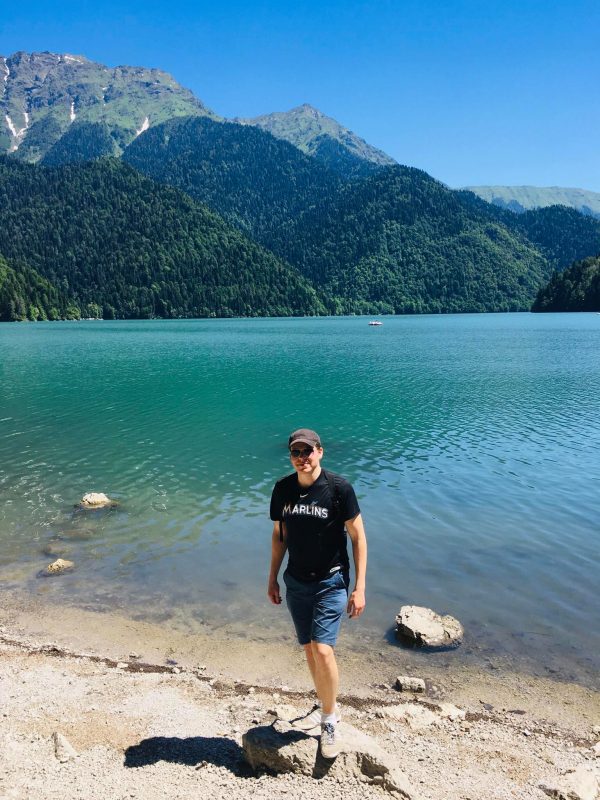
The road to Lake Ritsa is an exhilarating drive, taking a narrow and winding route through mountains up to 3500m high. You come out overseeing a crystal-clear lake, one of the deepest in the Caucasus, and surrounded on all sides by endless forests stretching up onto the peaks. The occasional tourist boat meanders across the still water, the place utterly calm apart from the occasional laughter from Russian families barbequing shaslik and drinking vodka on the shores.
Stalin’s Dacha
It is said that Soviet officials and apparatchiks would jostle for the chance to take their holidays in Abkhazia, and the place was loved by none more than Joseph Stalin himself. Hidden in a small forest just off from the lake is one of his favourite dachas (summer houses), painted green in an attempt to camouflage itself. Such was Stalin’s obsession with security he had in fact five different dachas across the region and would only decide at short notice which one was to be visited. This is evidenced further inside the building where there are three separate bedrooms, for Stalin liked to rotate every night to try and deceive any would be attackers.
New Athos (Novi Athon) Caves
Taking its modern name from the nearby monastery, for most of its existence the caves were simply known by locals at the ‘Bottomless Pit’. Further geological exploration in the mid-20th century however has identified it as the second largest cave complex in the world. Starting on the slopes of the Iverian Mountain, the cave stretches into a seemingly endless series of deep ravines, natural rivers and dark passageways. Exploration through the caves has now been aided by the construction of an eccentric but practical underground electric railroad, helping people travel from one cave hall to the next, journey which on foot would take hours.
New Athos Monastery
Whilst one will encounter a fair few cathedrals and monasteries whilst travelling through Russia and the Caucuses, the beauty of the New Athos Monastery is not to be missed. Founded in 1875 by a breakaway group of monks from the monastic communities of Mount Athos in Greece, it was dedicated to St Simon the Canaanite. Closed by the Soviet when they began their crackdown on religious worship, it was returned to the Orthodox Church after the end of the war in 1994. Today it stands as an excellent piece of Russian Imperial religious architecture and must be one of the few Orthodox monasteries surrounded by palm trees!
Psyrtskha Train Station
Once a central component in the Transcaucasus Railway, today this train station near New Athos lies in a state of photogenic decay, a lasting memorial to the Russian Empire and Soviet Union. The site of several battles during the war, whilst the path into Georgian is cut off there is still the occasional train which shuttles off towards Moscow through the mountains.
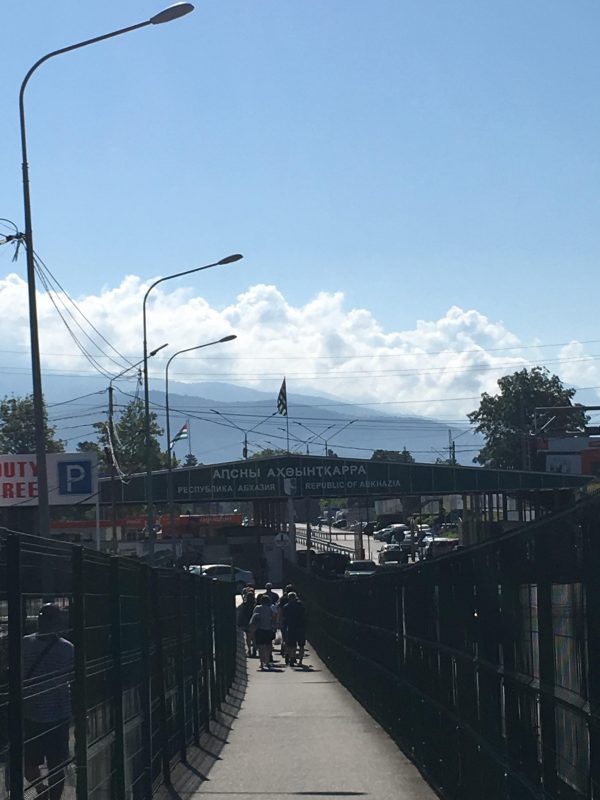
As the last light of the sun glistened off the Black Sea it was time for us to head back to the border, but not before picking up a bottle of local red wine with the Georgian region being one of the world’s oldest wine cultivation regions. At the border we were met by the same FB border guards awaiting our return, and with a nod and smile we were welcomed back into Russia. Whilst it would have been nice to have been able explore this enigmatic state further and continue visiting Abkhazia, we had a date back in northern Russia, concerning England’s continued march through the World Cup.
A last mention would go to the lovely people we met while visiting Abkhazia, ranging from the babushka who provided us with a delicious lunch of lamb, abysta (corn bread) and cheese in a cafe, to our driver Shamil. Shamil made an excellent point as we drove back towards Russia, passing the ruins of a burnt out T54 tank, asking how we can judge people in other countries and societies without understanding their background and experiences. Something which is perhaps more pertinent today more than ever.


